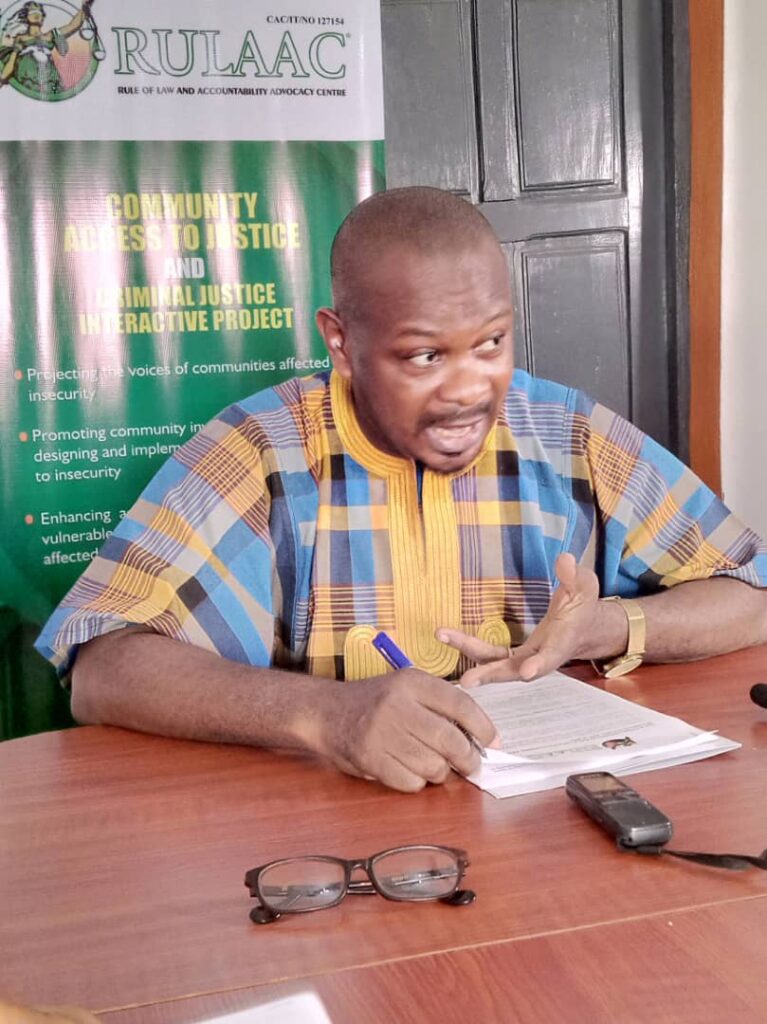Criminal cabal running South East, RULAAC warns in new report on state of region’s insecurity
By Ishaya Ibrahim
The Rule of Law Accountability and Advocacy Centre (RULAAC) has fingered the political leadership in the South East for the escalating state of insecurity in the region.
At a press conference held on Wednesday in Lagos to unveil a 68-page report on its fact-finding mission on the state of insecurity in the Southeast, RULAAC’s executive director Okechukwu Nwanguma said the political leadership in the Southeast is at best a criminal cabal that is unscrupulous, unconscionably corrupt, unpatriotic, and self-centred. He said they are in politics for self-enrichment at the expense of the welfare and security of the people.
Nwanguma said the region is in dire need of responsible political leadership that puts the people at the forefront, rather than perpetuating a system of corruption and self-interest.
The report published by RULAAC, in partnership with the Action Group on Free Civic Space, is titled – ‘Unveiling the Roots of Insecurity, Healing the Wounds of Human Rights Violations in the South East – A Path Towards Peace, Open Democratic Space and a Prosperous Future.’
The report posits that understanding the insecurity in the South East requires looking beyond simplistic narratives. It added that a nuanced examination of historical grievances, economic hardship, institutional weaknesses, and the interplay between state actors, armed groups, and communities is required.
The report observed that the heavy-handed tactics deployed by Nigerian security agencies in dealing with pro-Biafra agitators contributed significantly to the spate of violence in the region.
Lacing a background, the report noted that before IPOB, the Movement for the Actualisation of the Sovereign State of Biafra (MASSOB) held sway as the prominent pro-Biafra group, advocating for an independent state through non-violent methods. Yet, clashes with security forces, notably the Ezu River Massacre, raised concerns about their tactics.
As the influence of MASSOB withered with internal conflicts and allegations of mismanagement against its leadership, IPOB came into the fray in 2012, led by the charismatic Nnamdi Kanu.
“Based in London, Radio Biafra became his key tool, reaching disaffected youths across the South East and South. Kanu’s fiery rhetoric resonated with many who felt marginalized by the Nigerian government. These individuals, often young and unemployed, saw an independent Biafra as the path to achieving their aspirations. They viewed Kanu and IPOB as saviours, offering hope and a sense of belonging.”
RULAAC submitted that while IPOB activities could largely be described as peaceful at the time, even minor confrontations with security forces are often met with excessive force.
“Though IPOB protests remained mostly peaceful, the authorities started perceiving them as a threat, leading to a crackdown after September 2015.”
The report noted that Kanu’s arrest in October 2015 further complicated the situation.
“With increased crackdown against IPOB members, the militant Eastern Security Network was formed, marking a potential shift from peaceful activism to a more militant approach,” the report noted.
On what needs to be done, the report urged the government to engage with community leaders, youth organizations, and civil society to address grievances and promote peaceful resolutions. “Exclusive focus on military solutions to insecurity has proved to be counterproductive as it fails to address the root causes,” the RULAAC noted.
The report also called for security sector reform, saying it is imperative to ensure that security forces are professional, accountable, impartial, and trained in human rights approaches.
The report also advocated for citizens to be encouraged to participate in democratic processes and decision-making, fostering a culture of active citizenship.
Investing in job creations, infrastructure, and social services to address the root causes of unrest and disenfranchisement is also suggested.
The government should also guarantee protection for journalists and media outlets to ensure diverse voices and perspectives are heard, fostering informed public discourse.


